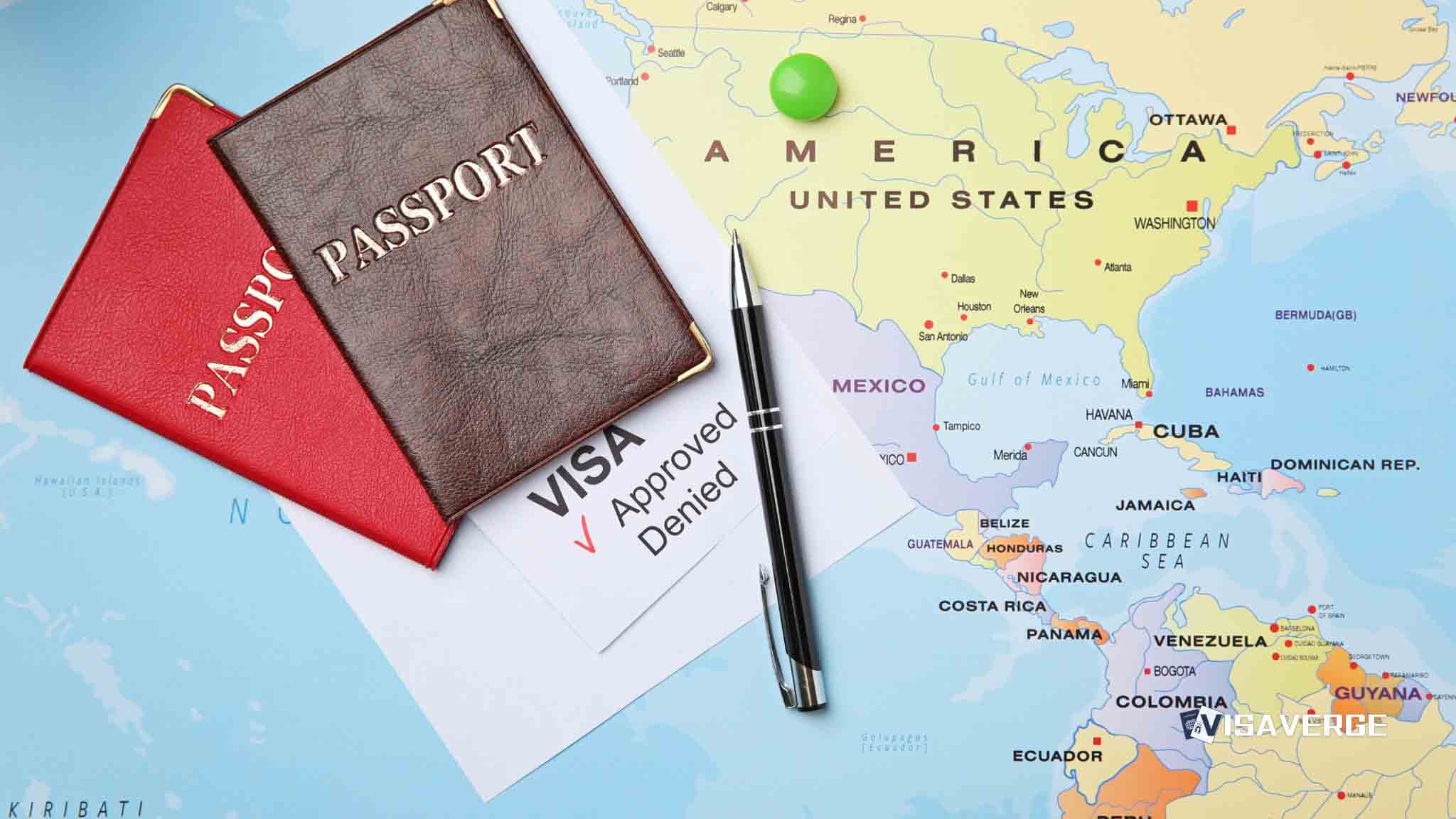Navigating the transition from a B1 Visa to an H3 Visa can be a complex process, but understanding the steps involved can make this journey smoother. Whether you’re currently on a B1 Visa for business purposes and are looking to receive training from a U.S. company through an H3 Visa, it’s essential to know the benefits and potential drawbacks before making a switch.
Understanding B1 and H3 Visa Differences
The B1 Visa is typically granted to individuals engaging in business activities of a commercial or professional nature in the United States. However, for those who wish to receive professional training, the H3 Visa is a more suitable option.
The H3 Visa enables foreign nationals to enter the U.S. to receive training from an employer in any field of endeavor, except for graduate education or training. The training can be provided by a business entity, a non-profit, or a government organization.
The Visa Transfer Process
Shifting from a B1 to an H3 Visa involves several critical steps:
1. Evaluate Eligibility
Ensure that you meet the H3 Visa requirements, which include having a foreign residence you have no intention of abandoning and not receiving training that would provide employment for U.S. residents.
2. Locate a Sponsor
You will need to find a U.S. employer willing to provide the training and sponsor your visa application.
3. File a Petition
Your sponsor must file Form I-129, Petition for a Nonimmigrant Worker, on your behalf. The petition includes Form I-129H3, the supplement for the H3 Visa.
4. Apply for the Visa
Once the petition is approved, apply for the H3 Visa at a U.S. Embassy or Consulate.
Remember to check the U.S. Citizenship and Immigration Services (USCIS) for the latest on the application process and required forms.
Advantages of Transferring to an H3 Visa
Receive Specialized Knowledge: The main advantage is gaining highly specialized knowledge or training which is not available in your home country.
Potential Job Opportunities: While you cannot be employed during your training, acquiring unique skills may improve your job prospects post-training.
Duration: H3 Visa holders can stay in the U.S. to complete their training for up to two years, which is more training time than what is typically granted on a B1 Visa.
Disadvantages of the Visa Transfer
Limited Scope: The training should not be available in your country and cannot be used to provide productive employment. If it’s deemed as such, you risk visa denial or revocation.
No Dual Intent: Unlike some other visa categories, the H3 does not allow dual intent. This means you can’t pursue permanent residency during your stay.
Dependent Restrictions: While spouses and children under 21 can accompany you, they cannot engage in employment in the U.S.
Key Considerations
Before you initiate the transition process, consider the following:
- Timing: The processing times for H3 Visa petitions can vary. Therefore, it’s paramount to start the process well in advance to ensure a smooth transition.
- Training Program Credibility: Ensure the training program is legitimate and recognized. USCIS may deny a petition if it appears to be crafted to circumvent labor laws.
- Legal Complexity: Given the complexities of immigration law, consulting with an immigration attorney to guide you through the process may be beneficial.
Transitioning from a B1 to an H3 Visa could potentially open doors to new opportunities and enhance your career trajectory. Nevertheless, the move should be meticulously planned, considering all the advantages and disadvantages associated with the H3 Visa. Remember, a successful switch largely hinges on adhering to the immigration laws and procedure laid down by USCIS.
As you weigh your options for transferring from a B1 to an H3 Visa, utilize authoritative resources such as the official USCIS website for accurate and up-to-date information. It is crucial to embark on this journey with all the necessary information at hand, ensuring that your pursuit of enhanced professional training in the U.S. is within the bounds of the law.
Still Got Questions? Read Below to Know More:
What happens if the company training me on an H3 visa goes out of business
If the company training you on an H-3 visa goes out of business, the following actions and consequences are likely:
- Visa Status: Your H-3 visa status is dependent on your employment with the company that sponsored your training program. If the company ceases to exist, you are no longer able to fulfill the conditions of your H-3 status, as there is no longer a training program to participate in.
- Departure from the U.S.: Since your legal status is tied to the existence of your training program, you are typically expected to leave the United States promptly. The U.S. Citizenship and Immigration Services (USCIS) does not provide an automatic grace period for H-3 visa holders in these circumstances, so departure should be arranged without unnecessary delay.
-
Change of Status or Transfer: You might have the option to change your status to another visa category or transfer your H-3 to another petitioner if there are other companies offering a similar training program and willing to sponsor you. However, such changes must be approved by the USCIS before you can start training with a different sponsor.
“If the training program is no longer available, the trainee may be required to depart the United States unless they change to another nonimmigrant status.” – U.S. Department of State (https://travel.state.gov/content/travel/en/us-visas/employment/temporary-worker-h3-visa.html)
It’s important to act quickly and consult an immigration attorney to understand your options, which might include applying for a change of status or seeking a new sponsor. Failure to maintain legal status or to depart in a timely manner can result in being out of status, which can have serious consequences for future immigration benefits.
For official guidance, always refer to USCIS (https://www.uscis.gov/) or the U.S. Department of State’s website, and for specific situations, seek the advice of a qualified immigration attorney.
If my B1 visa expires while I’m applying for an H3, do I have to leave the US
If you are in the United States on a B1 visa and you’re applying for an H3 (Trainee or Special Education visitor visa), you don’t necessarily have to leave the country when your B1 visa expires. The key factor is to ensure that you have filed a timely application for a change of status with U.S. Citizenship and Immigration Services (USCIS) before your B1 status expires. Here are important points to consider:
- Timely Filing: As long as you file your Form I-129, Petition for a Nonimmigrant Worker, for the H3 status before your B1 visa expires, you are generally allowed to stay in the U.S. while your application is being processed, even if your visa expires during the process. USCIS explains this policy in their resources:
“You do not need to leave the United States when your nonimmigrant visa expires if… You have applied for an extension, change or adjustment of status before your current status expires.”
- Maintaining Legal Status: It is crucial to maintain your legal status while in the U.S. You must adhere to the terms of your B1 visa until your H3 petition is approved. Overstaying or violating the terms of your visa can negatively impact your immigration status and future applications.
-
Processing Times and Decisions: The processing time for the H3 petition varies, and there is no guarantee of approval. If your petition is not approved before your B1 status expires, and you have not applied for an extension of your B1 status, you may need to prepare to leave the U.S. to avoid overstaying and the potential consequences.
For the most accurate information and advice tailored to your specific situation, it’s best to consult an immigration attorney or refer to the official website of the USCIS: https://www.uscis.gov/
Can my spouse study on a dependent H4 visa while I’m in the US on an H3
Yes, your spouse can study on a dependent H4 visa while you are in the United States on an H3 visa. Holders of H4 visas, which are issued to immediate family members (spouses and children under 21 years of age) of the H visa holders, are allowed to enroll in academic studies. Here are some key points to consider:
- Enrollment in studies: Your spouse can enroll in both part-time and full-time study programs while on an H4 visa. There is no restriction on the level of study, so they could pursue anything from recreational courses to a full degree program at a university.
- Employment restrictions: While H4 visa holders can study, they may face restrictions on employment. Generally, H4 visa holders cannot work unless they have obtained an Employment Authorization Document (EAD) under specific circumstances.
-
Visa status changes: If your spouse wishes to work on campus or needs to engage in practical training related to their studies, they might need to change their visa status from H4 to F1 (student visa). An F1 visa provides more options for on-campus employment and practical training opportunities, such as Optional Practical Training (OPT) or Curricular Practical Training (CPT).
For official and detailed information, always refer to the U.S. Citizenship and Immigration Services (USCIS) or consult an immigration attorney. USCIS provides information related to H4 visas and the allowable activities while on this visa type. For more information, you can visit the official USCIS page for H4 visa holders: USCIS H4 Visa. It’s important to maintain valid immigration status at all times and adhere to the regulations of the visa. In case of any changes in your spouse’s educational or employment plans, it is advisable to consult with an immigration attorney to ensure these changes are in compliance with U.S. immigration laws.
Are there any restrictions on traveling outside the US and coming back while on an H3 visa
Yes, individuals on an H3 visa, which is a non-immigrant training visa, have specific restrictions when it comes to traveling outside the U.S. and returning. Here are the key points to keep in mind:
- Maintaining Valid H3 Status: You must maintain valid H3 status, which involves participating in the training program you were approved for. Your absence should not disrupt this training program.
- Valid Visa and Passport: Before traveling, ensure that your H3 visa is still valid for re-entry, and your passport is valid for at least six months beyond the period of H3 visa validity.
-
Documents for Re-entry: When returning to the U.S., you should carry the following documents:
- Valid H3 visa stamp in your passport.
- Your Form I-797, Notice of Action, indicating the approval of your H3 status.
- A letter from your U.S. employer/training program confirming your participation and the necessity of your return to continue the training.
It’s important to note that if your H3 visa has expired while you’re outside the United States, you must obtain a new H3 visa at a U.S. Embassy or Consulate before you can return. Keep in mind that the process for obtaining a new visa may sometimes be lengthy, so you should plan accordingly.
According to U.S. Citizenship and Immigration Services (USCIS), “If you apply for a visa, you should be aware that you may not be able to return to the United States in H-3 status if you have previously spent time here on a different nonimmigrant visa.” This means you need to be cautious about the time you spend in the U.S. on various nonimmigrant visas, as it might affect your H3 visa status.
For more detailed information and to stay updated on the latest requirements, it’s advisable to check the official USCIS website or the Department of State’s travel page:
- USCIS H3 Visa Information: USCIS H-3 Nonimmigrant Trainee or Special Education Exchange Visitor
- U.S. Department of State Travel and Visa Information: U.S. Visas
Can I do part-time work unrelated to my H3 training program while on the visa
No, as an H3 visa holder, you are not allowed to engage in part-time work that is unrelated to your training program. The H3 nonimmigrant visa category is specifically designed for individuals who are coming to the United States to receive training (other than graduate medical education or training) that is not available in their home country. The purpose of the H3 visa is for the training itself, and the regulations are strict about maintaining the scope of the visa’s intent.
According to the U.S. Citizenship and Immigration Services (USCIS), “An H-3 trainee must be invited by an individual or organization for the purpose of receiving training, other than graduate or medical education training, that is not available in the foreign national’s home country.” This means that the primary activity in the U.S. must be to participate in the training program specified in the visa application.
In addition, the Code of Federal Regulations (CFR) states, “An H-3 classification may not be used for productive employment unless it is incidental and necessary to the training.” This makes it clear that productive work outside the boundaries of the training program is not permitted on an H3 visa. Violating these terms can have serious consequences, including visa cancellation and difficulties with future immigration status. For specific cases and more detailed information, it’s always best to consult the official USCIS website or a legal immigration expert. Official US immigration resources can be found at USCIS and the relevant section of H3 visa information is available under the H3 Nonimmigrant Trainee or Special Education Visitor visa category.
Learn today
Glossary of Immigration Terms
B1 Visa: A nonimmigrant visa granted to individuals engaging in business activities of a commercial or professional nature in the United States.
H3 Visa: A nonimmigrant visa that allows foreign nationals to enter the U.S. to receive training from an employer in any field of endeavor, except for graduate education or training.
Visa Transfer: The process of transitioning from one visa category to another.
Eligibility: Meeting the requirements set forth by the government for a particular visa category.
Foreign Residence: A place of residence outside the United States that an individual does not intend to abandon.
Form I-129: Petition for a Nonimmigrant Worker, which is filed by a sponsor on behalf of a foreign national to request permission for the individual to work temporarily in the U.S.
Form I-129H3: Supplement to Form I-129 specifically designed for the H3 Visa category.
USCIS: U.S. Citizenship and Immigration Services, the government agency responsible for immigration services and benefits.
U.S. Embassy or Consulate: The diplomatic mission responsible for issuing visas and providing services to foreign nationals in a host country.
Specialized Knowledge: Highly specific expertise or training that is not readily available in an individual’s home country.
Job Opportunities: Potential employment prospects that may arise after completing specialized training on the H3 Visa.
Duration: The period of time for which an H3 Visa holder is permitted to stay in the U.S. to complete their training, which is generally up to two years.
Scope: The extent or range of the training program, which should not be available in an individual’s home country and should not be used to provide productive employment.
Dual Intent: The concept that allows certain visa holders to pursue permanent residency while also having a nonimmigrant intent to stay temporarily in the U.S. The H3 Visa does not permit dual intent.
Dependent Restrictions: Limitations on the ability of spouses and children under 21 to engage in employment while accompanying the H3 Visa holder in the U.S.
Processing Times: The amount of time it takes for a visa application or petition to be reviewed and approved or denied by the USCIS.
Training Program Credibility: Ensuring that the training program is legitimate and recognized by USCIS to avoid potential denial of the visa petition.
Immigration Attorney: A lawyer specializing in immigration law who provides legal advice and guidance to individuals navigating the immigration process.
To sum it up, transitioning from a B1 Visa to an H3 Visa for professional training may seem complex, but understanding the process and requirements can make it easier. While there are advantages like specialized knowledge and potential job opportunities, there are also limitations to consider. Remember to consult an immigration attorney, stay informed with USCIS, and explore visaverge.com for more useful information. Good luck on your visa journey!















